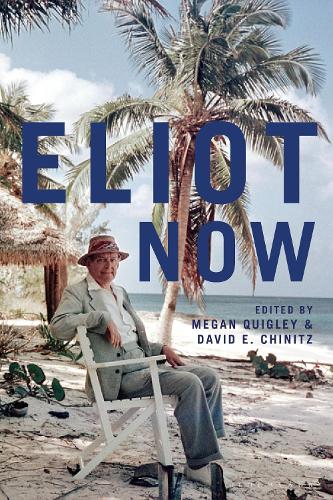
Eliot Now
(Hardback)
Available Formats
Publishing Details
Eliot Now
By (Author) Megan Quigley
Edited by David E. Chinitz
Bloomsbury Publishing PLC
Bloomsbury Academic
22nd August 2024
United Kingdom
Classifications
Professional and Scholarly
Non Fiction
Literary studies: c 1900 to c 2000
821.912
Physical Properties
Hardback
288
Width 155mm, Height 234mm, Spine 20mm
580g
Description
Over a dozen new volumes of T S Eliots poetry, prose, and letters have been published since the death of his widow in 2012. This book presents unabashedly fresh approaches to Eliot, while simultaneously guiding readers through the new materials that are available for the first time outside of restricted archives. Eliot, the figurehead of literary modernism, continues to be someone whom critics love to hate (Misogynist! Conservative! Anti-Semite!) and readers love to devour (Profound! Revolutionary! Resonant!). Why does one figure elicit such different responses Eliots influence on literary studies and modern poetry is immense, and yet 90% of Eliot scholarship has been written without knowledge of 90% of what Eliot actually wrote in his lifetime, as Ronald Schuchard, the general editor of the Complete Prose, has estimated. Eliot Now collects new and established voices in Eliot studies at the centenary of The Waste Land to begin to correct that oversight, integrating contemporary critical approaches with careful attention to the newly published materials. Whether grappling with the controversial new two-volume Poems, narrating the experience of opening Eliots letters in the Emily Hale papers (called the most famous sealed archive in the world), or re-reading Eliot works through ecocritical or trans* lenses, Eliot Now shows how this most renowned 20th-century literary figure continues to change the way we read literature today.
Author Bio
Megan Quigley is the author of Modernist Fiction and Vagueness: Philosophy, Form, and Language (2015). Her work has also appeared in The Cambridge Companion to European Modernism, the James Joyce Quarterly, The Journal of the T. S. Eliot Society, Modernism/modernity, and Philosophy and Literature, and is forthcoming in Poetics Today. She introduced and edited a series of short essays for the Modernism/ modernity print plus series called Reading The Waste Land with the #MeToo Generation. She is currently at work on a project investigating T. S. Eliots relationship to fiction and fictionality. David E. Chinitz is the author of T. S. Eliot and the Cultural Divide (2003) and of Which Sin To Bear Authenticity and Compromise in Langston Hughes (2013). Most recently he co-edited The Complete Prose of T. S. Eliot, Volume 6: The War Years, 1940-1946 (2017); he has also edited A Companion to T. S. Eliot (2009) and co-edited A Companion to Modernist Poetry (2014). He has served as president of the Modernist Studies Association and the International T. S. Eliot Society.
